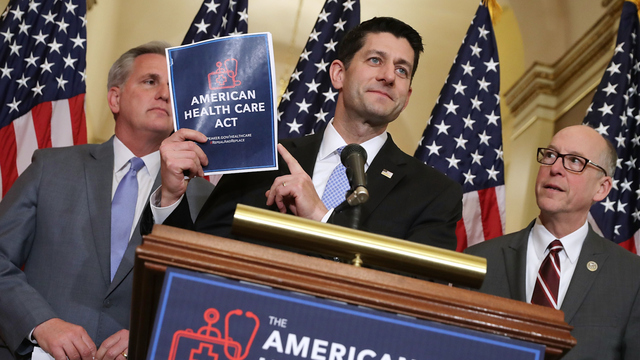Ending Obamacare Mandate Could Save $338 Billion for Tax Bill

(Bloomberg) —Rolling back Obamacare’s requirement that all Americans have health insurance would save the U.S. $338 billion over 10 years, according to the Congressional Budget Office, a smaller benefit than previously projected for a plan favored by the White House.
Republicans are considering repealing the coverage rule in the Affordable Care Act as a way to pay for far-reaching changes in the tax code. The savings would come from the government spending less to subsidize Obamacare plans as more people opt to forgo health coverage.
While ending the mandate could free funds up for a tax overhaul, it would also leave people without health insurance and lead to higher premiums. CBO estimated Wednesday that 13 million more people would be uninsured in 2027 compared with current law if the mandate is repealed starting in 2019. Premiums would increase by about 10 percent in most years of the decade the report covers.
Both the savings and coverage losses are lower than CBO’s December projection, in part because the non-partisan agency updated the impact from the federal health-insurance subsidies and determined that people and their employers would take longer than it previously thought to make changes to their insurance plans.
Back in December, CBO said eliminating the mandate would reduce the deficit $416 billion over a decade, and lead to 15 million more people without health insurance. The new number of 13 million doesn’t take into account a decision by President Donald Trump to stop paying cost-sharing reduction payments made to insurers under Obamacare to help Americans afford health costs, CBO said Wednesday.
Spread Risk
The mandate is meant to spread risk evenly among healthy and sick people to help keep overall costs down. Without it, healthier people could buy cheaper plans that don’t meet Obamacare coverage requirements, while those who need care, such as people with pre-existing medical conditions, will face rising costs.
Concerns about people losing coverage doomed a Senate bill that would have ended the mandate while leaving other parts of the ACA intact, known as “skinny repeal,” in July.
The House Committee on Ways and Means started debate Monday on the tax bill, called the Tax Cuts and Jobs Act. An amendment from Chairman Kevin Brady revised one of the GOP tax bill’s offshore provisions — leading to an estimated $74 billion revenue hole, which is sending tax writers scrambling to find additional revenue.
Trump backed overturning the mandate in a tweet last week, pushing for the savings generated to be used “for further Tax Cuts.” House Speaker Paul Ryan said on “Fox News Sunday” that GOP leaders are considering the idea.
CBO’s December estimates covered the 2018 -2026 period. The new projections assume the mandate would be repealed in 2019 and apply to the years 2018 to 2027. The CBO said that it is revising its methods for calculating the effects of repealing the mandate but isn’t including major changes in this analysis.



No Comment